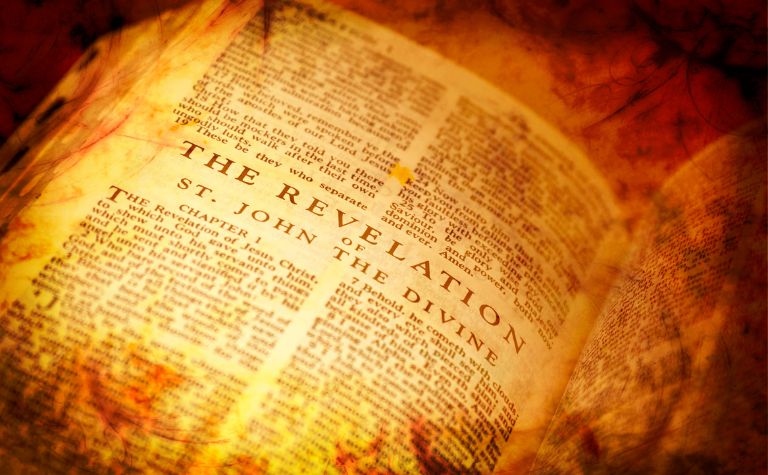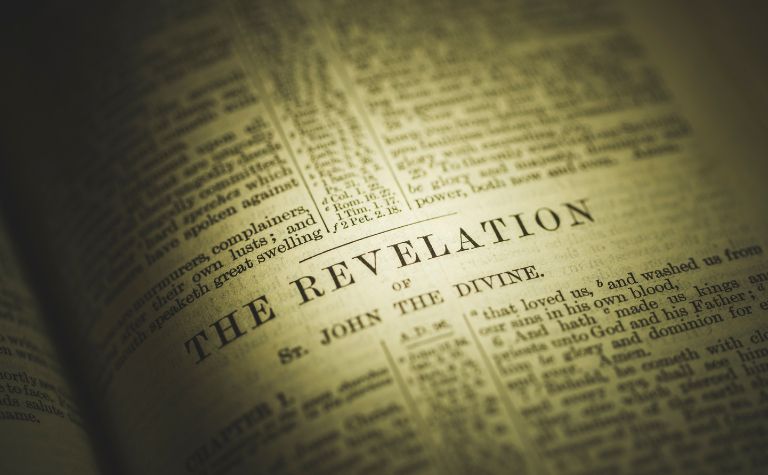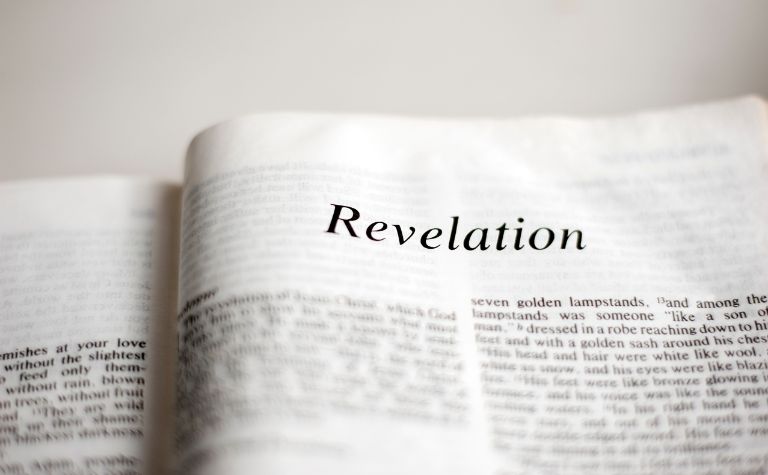Many readers find Revelation one of the most exciting books in Scripture. It’s the 66th book of the Bible and the 27th of the New Testament. Even though it’s the last book, it’s of utmost importance to understanding God and his plan for the world. Part of understanding Revelation’s message is knowing who wrote it.
The author of Revelation calls himself John multiple times. Most early-church leaders identify him as John the Apostle, the son of Zebedee, the author of the fourth Gospel and 1-3 John. Some modern scholars reject the Apostle as Revelation’s author but disagree on which “John” wrote it.
What does the “John” in Revelation say about himself in addition to his name? How many different Johns does the New Testament mention? What is the difference between them? Who do the early church fathers like Irenaeus and Tertullian say wrote Revelation? Keep reading to learn the answers to these questions and others.
Also, see Who Wrote Acts in the Bible? to learn more.

The Writer of Revelation Calls Himself John
Internal evidence for authorship refers to details about the writer that readers can find in the biblical text. External evidence is the support located outside the text, such as the perspectives of the early church fathers, including those who knew John the Apostle or his disciples (see below).
The most substantial internal evidence that John is the author of Revelation is that he clearly states his name four times in the book. To argue that John isn’t the author requires dismissing the book’s straightforward teaching. Less clear is which John it is as there is little detail about his identity in the text.
The name John appears four times in the book
Readers can learn about “John” from verses mentioning his name. Yet, the details in the text are insufficient to say whether it’s John the Apostle or any other one with certainty. Identifying “John” with the Apostle is rooted in the near-unanimous views of the early church fathers (more below).
(1) In Revelation 1:1, John describes himself as God’s servant who had a relationship with Jesus Christ. “The revelation of Jesus Christ, which God gave him to show to his servants the things that must soon take place. He made it known by sending his angel to his servant John” (ESV).
(2) Furthermore, Revelation 1:4 implies that John had a relationship with churches on the west coast in the region of Asia Minor (i.e., present-day Turkey). “John to the seven churches that are in Asia: Grace to you and peace from him who is and who was and who is to come, and from the seven spirits who are before his throne” (ESV).
(3) Then, in Revelation 1:9, John identifies himself as a fellow Christian who was exiled to Patmos, an island off the western coast of Asia Minor. “I, John, your brother and partner in the tribulation and the kingdom and the patient endurance that are in Jesus, was on the island called Patmos on account of the word of God and the testimony of Jesus” (ESV).
(4) The only reference to John outside the first chapter is in Revelation 22:8, in which he describes receiving the revelation of Jesus Christ that is contained in the book. “I, John, am the one who heard and saw these things. And when I heard and saw them, I fell down to worship at the feet of the angel who showed them to me” (ESV).
The New Testament mentions four Johns
| Which John? | Details |
|---|---|
| John, the Apostle, Son of Zebedee | Son of Salome, brother of James; a fisherman; wrote the Gospel and 1-3 John |
| John the Baptist | Preached repentance and the arrival of God’s kingdom; baptized Jesus; Herod beheaded |
| John, a relative of Annas | Not a Christian; part of a group that questioned Peter and John, Son of Zebedee (Acts 4:6) |
| John Mark | Commonly called “Mark,” the author of the second Gospel; cousin of Barnabas; accompanied Paul on his first missionary journey |
No scholar suggests that Annas’ relative wrote Revelation. John the Baptist died too early to write the book. John Mark is known as “Mark” in the New Testament, but never “John.” John the Apostle is the most likely author based on the procession of elimination.
Does John imply that he is an apostle?
Some Revelation scholars believe the way John describes himself in certain verses suggests he was an apostle. For example, in Revelation 22:18-19, the book is called prophecy, and punishment results from changing it. The word “prophecy” indicates the book is God’s Word, not a person’s (see 2 Pet. 1:21).
The verses read: “I warn everyone who hears the words of the prophecy of this book: if anyone adds to them, God will add to him the plagues described in this book, and if anyone takes away from the words of the book of this prophecy, God will take away his share in the tree of life and in the holy city, which are described in this book.”
The warning also protects the book’s content and message, suggesting that the prophecy is sacred and perfect.
Also, see Who Wrote Hebrews in the Bible? to learn more.

Early Christian leaders on Revelation’s author
Certain Christian leaders in the second century after Christ referred to John the Apostle as the author of Revelation, including Justin Martyr (100-165 A.D.), Melito of Sardis (died in 180 A.D.), and Irenaeus of Symrna (130-202 A.D.). As a child, Irenaeus knew Polycarp (69-155 A.D.), a disciple of John the Apostle.
Some scholars suggest that Papias of Hierapolis, who knew John the Apostle, also attributed Revelation to John the Apostle (60-130 A.D.). However, others question the reliability of his writings.
Additionally, third-century church leaders like Tertullian (155-220 A.D.), Hippolytus (170-235 A.D.), and Origen ascribe Revelation to John the Apostle (185-253 A.D.).
Some Bible scholars believe that John the Apostle’s authorship of Revelation is one of the most straightforward cases of authorship in the New Testament. [1]
Also, see Who Wrote Romans in the Bible? to learn more.

Why Do Some Think John the Apostle Didn’t Write Revelation?
Dionysius of Alexandria (d. 264 A.D.) is an example of an early-church leader who didn’t believe John the Apostle wrote Revelation.
His primary arguments are (1) “John” never identified himself as an apostle, (2) Revelation is theologically different than the Gospel of John, and (3) the Greek of Revelation is different from the Gospel and 1-3 John. Dionysius’ arguments are persuasive to some Bible scholars today.
Scholars D.A. Carson and Douglas Moo respond: “While the difference in Greek style is a problem, we are not convinced that the arguments of Dionysius or his latter-day followers make it impossible for the same person to have written both the fourth gospel and Revelation.”
He continues, “We are inclined this to accept the testimony of those who were in a position to know about these matters, and we attribute both books to John the Apostle.” [2]
Revelation commentator Robert Mounce adds, “The unusually strong and early external evidence supporting apostolic authorship should cause us to hesitate before accepting a conclusion based on [the] subjective appraisal of internal considerations.”
He adds, “Since internal evidence is not entirely unfavorable to apostolic authorship and external evidence is unanimous in its support, the wisest course of action is to accept as a reasonable hypothesis that the Apocalypse was written by John the apostle, son of Zebedee and disciple of Jesus.” [3]
Also, see Who Wrote Proverbs in the Bible? to learn more.
References:
[1] An Introduction to the New Testament by D.A. Carson and Douglas Moo. p. 700.
[2] Ibid. p. 705.
[3] The Book of Revelation by Robert Mounce. p. 15.
Related Questions
Regular Bible reading is a valuable habit, as Scripture is God's message to people. However, the Bible's 66 distinct books, featuring various authors, settings, and themes, can make it challenging...
There are 66 individual books in the Bible. There are 39 in the Old Testament and 27 in the New Testament. Many readers can read the shortest books in the Bible in 5 to 10 minutes. The longest book...
